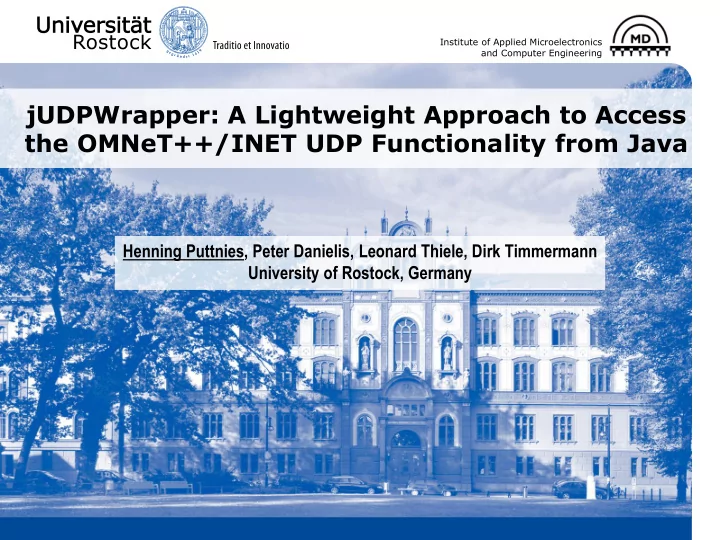

Institute of Applied Microelectronics and Computer Engineering jUDPWrapper: A Lightweight Approach to Access the OMNeT++/INET UDP Functionality from Java Henning Puttnies, Peter Danielis, Leonard Thiele, Dirk Timmermann University of Rostock, Germany
Institute of Applied Microelectronics and Computer Engineering Motivation Evaluation of networks during design: simulation, testbed, math analysis Our idea of an enhanced evaluation methodology: 1. Java simulation models using OMNeT++ 2. Derive a Java prototype implementation Java Extensions for OMNeT++ (JEO) exist Next logical step: provide a socket-based API for Java simulation models Abstraction layer between app. layer models und INETs UDP module Ease simulating as well as the derivation of prototype implementation 10/09/2018 OMNeT++ Community Summit 2018 2
Institute of Applied Microelectronics and Computer Engineering Related Work Wanted: Framework to simulate Java application layer models Name Java Simulation Access to Still Under Models Simulation Maintenance Time NS-3 + LXC* + JVM (*Linux Containers) (only app. (only with layer) modified Linux kernel, limited precision) NS-3 + DCE* (*Direct Code Execution) (C++ only) FNSS* (*Fast Network (needs a Java (there is no Simulation Setup) simulator/ Java simulator) emulator) JNS/ JNetworkSim/ Jprowler/ Java Simulator 10/09/2018 OMNeT++ Community Summit 2018 3
Institute of Applied Microelectronics and Computer Engineering jUDPWrapper – Basic Concept Design targets: Fit optimally into the OMNeT++/INET ecosystem No modifications of the OMNeT++/INET code Lightweight keep track with new OMNeT++/INET versions easily DatagramSocket and InetAddress : Same API as java.net.DatagramSocket and java.net.InetAddress Java App Layer App Layer Models C++ UDP App on StandardHost Java UDP App on StandardHost Models (INET or Custom) simple JUdpEchoApp extends UDPBasicApp like IUDPApp Java JSimpleModule like IUDPApp jUdpWrapper INET (Wrapper for (Wrapper for Socket API) Socket API) udp like IUDP udp like IUDP C++ INET (Protocol Stack, networklayer networklayer Pyhsical Models) OMNeT++ (Event Handling) <physicallayer> <physicallayer> 10/09/2018 OMNeT++ Community Summit 2018 4
Institute of Applied Microelectronics and Computer Engineering jUDPWrapper – Accessing Message Fields of a Custom Data Type from Java: e.g., L3Address UDPControlInfo.msg cObject.setField("destAddr", ) UDPSendCommand SimkernelJNI.cObject_setField() L3Address destAddr int destPort L3Address srcAddr Java_org_omnetpp_simkernel_SimkernelJNI_cObject_1setField() int interfaceId C++ Code L3Address.h/.cc omnetpp_cObject_setField() L3Address cClassDescriptor.setFieldValueAsString() uint64 hi uint64 lo UDPSendCommandDescriptor.setFieldValueAsString() L3Address() L3Address(const char *str) String as type for domain conversion L3Address(const IPv4Address& addr) getField() : can access any field of a message setField() : only works for standard types (e.g., int , double , bool ) how to access a field of a custom type? Our approach: utilize a special syntax in the *.msg file link the setFied() method to the corresponding string constructor 10/09/2018 OMNeT++ Community Summit 2018 5
Institute of Applied Microelectronics and Computer Engineering jUDPWrapper – Accessing Message Fields of a Custom Data Type from Java: e.g., L3Address 2 //Original *.msg file //Modified *.msg file class UDPSendCommand extends class UDPSendCommand extends UDPControlInfo { UDPControlInfo { L3Address destAddr; L3Address destAddr @editable @fromstring(inet::L3Address($)); int destPort = -1; int destPort = -1; //... //... } } //Modified *.cc file //Original *.cc file bool UDPSendCommandDescriptor:: bool UDPSendCommandDescriptor:: setFieldValueAsString(/*...*/) const { setFieldValueAsString(/*...*/) const{ //... //... switch (field) { switch (field) { case 0: pp->setDestAddr(inet::L3Address( value)); return true; case 1: pp->setDestPort(string2long( case 1: pp->setDestPort(string2long( value)); return true; value)); return true; //... //... }} }} 10/09/2018 OMNeT++ Community Summit 2018 6
Institute of Applied Microelectronics and Computer Engineering jUDPWrapper – UDP Example Networks Four example networks used for evaluation Show interoperability and performance of Java and C++ application layer simulation models Every network: 2 StandardHosts connected Ethernet switch (not shown for the sake of simplicity) jUDPBasicApp and jUDPEchoApp equivalent to their INET counterparts Evaluation of performance is feasible inet::UDPBasicApp jUDPBasicApp jUDPBasicApp inet::UDPBasicApp inet::UDPEchoApp JUdpEchoApp inet::UDPEchoApp JUdpEchoApp 10/09/2018 OMNeT++ Community Summit 2018 7
Institute of Applied Microelectronics and Computer Engineering jUDPWrapper – Performance Evaluation 1 Execution time grows linearly with the # packets expected behaviour OMNeT++ 5.0: 10 packets: C++ (0.0008s) approx. one order of magnitude faster than Java (0.0097s) 100,000 packets: C++ (6.89s) approx. twice as fast as Java (14.5s) OMNeT++ 5.0 100 UDPBasic + UDPEcho UDPBasic + jUDPEcho jUDPBasic + UDPEcho jUDPBasic + jUDPEcho 10 Execution Time [s] 1 0.1 0.01 0.001 0.0001 # Packets 10 100 1,000 10,000 100,000 10/09/2018 OMNeT++ Community Summit 2018 8
Institute of Applied Microelectronics and Computer Engineering jUDPWrapper – Performance Evaluation 2 OMNeT++ 5.4: 10 packets: C++ (0.0013s) approx. 3 times faster than Java (0.0036s) 100,000 packets: C++ (6.04s) approx. twice as fast as Java (14.39s) Remarkable: intermediate performance of mixed language setups Use existing C++ modules from INET to work with your Java modules OMNeT++ 5.4 100 UDPBasic + UDPEcho UDPBasic + jUDPEcho jUDPBasic + UDPEcho jUDPBasic + jUDPEcho 10 Execution Time [s] 1 0.1 0.01 0.001 # Packets 10 100 1,000 10,000 100,000 10/09/2018 OMNeT++ Community Summit 2018 9
Institute of Applied Microelectronics and Computer Engineering Conclusion and Outlook jUDPWrapper: simple + socket-based interface to INET's UDP functionality Generic approach to access message fields that have a custom data type Serves as example of how to access INET modules from Java Different example applications for custom Java simulation models Evaluation: OMNeT++ 5.0/INET 3.4.0 and OMNeT++ 5.4/INET 3.6.4. Provide the Java Extensions for OMNeT++ 5.4 Performance: C++ approx. twice as fast as Java simulation models Valid for long simulation runs and release mode Speedup reduced in debug mode or if a mixed language setup is used Entire system is publicly available 1 Everyone can retry the performance measurements Interesting for future work: Wrapper for INET’s TCP functionality 1 https://bwsyncandshare.kit.edu/dl/fi8R6skmuBPh6UfXHWzcgBxt/.zip 10/09/2018 OMNeT++ Community Summit 2018 10
Institute of Applied Microelectronics and Computer Engineering Thank you for your attention. Questions? 10/09/2018 OMNeT++ Community Summit 2018 11
Recommend
More recommend